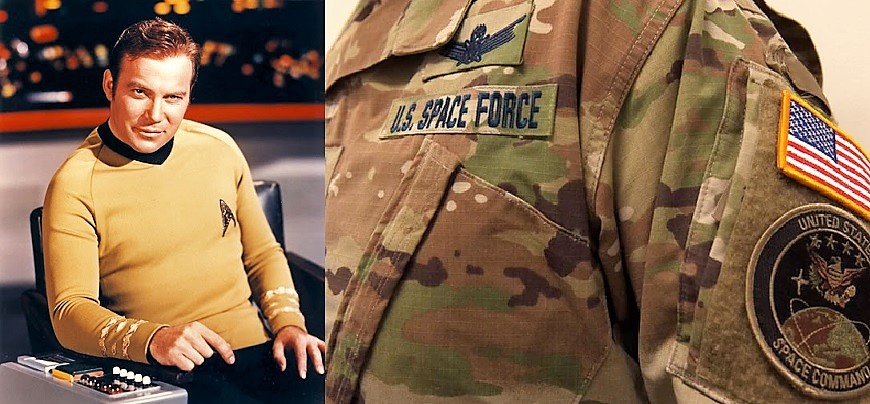TV’s most outspoken (and greatest) space explorer has a question for the minds behind the U.S. military’s newest branch: “What the heck is wrong with you, Space Force?”
In a Military Times op-ed published today, actor William Shatner railed against the U.S. Space Force for choosing the Air Force’s officer rank structure over the Navy’s, contravening decades of science fiction conventions.
“Do you know your entertainment space history? Let me show you what I mean,” wrote Shatner, who played Captain, later admiral, James T. Kirk on “Star Trek.”
“Throughout entertainment history, which precedes actual space flight history by decades, we had captains,” he wrote, providing examples of Navy ranks adopted for fictional space exploration dating back to the early 20th century.
Shatner invoked the heroic exploits of fictional space captains, while poking fun at TV space colonels.
“We cannot forget [U.S. Air Force] Colonel Steve Austin, an astronaut who crashed his ship and severely injured himself that cost taxpayers $6 million to put him back together, who was portrayed by my dear friend, Lee Majors,” wrote Shatner, referring to the 1970s TV series “The Six Million Dollar Man.”
A Navy captain holds a rank equivalent to an Air Force, Marine Corps or Army colonel.
The Air Force inherited its ranking structure as an offshoot of the Army in 1947, when the U.S. Army Air Forces became a standalone branch.
Space Force kept the same structure when the Air Force Space Command split from the Air Force in December.
In his op-ed, Shatner suggested borrowing the rank structure made famous in “Star Trek,” following in the footsteps of creator Gene Roddenberry, who chose the Navy ranks for his Starfleet despite having been an officer in the U.S. Army Air Forces.
“They made better sense when talking about a (space) ship,” explained Shatner.
Dear @SpaceForceDoD, I have a question to ask, if it’s OK. I’m just a nobody here but I was wondering; is it true that the commanding officer onboard a “Space Force” ship is designated a Colonel & not a Captain? 😳🤷🏼♂️ Is this up for debate? I think I’d like to debate the issue.😉
— William Shatner (@WilliamShatner) August 22, 2020
It may not be too late for lawmakers to see things Shatner’s way.
Space Force’s rank structure is not yet set in legislative stone.
The House version of the 2021 National Defense Authorization Act (NDAA) includes a provision that the Space Force must adopt the Navy’s rank structure.
The amendment, proposed by Rep. Dan Crenshaw (R-Texas), a former Navy SEAL, would bring back the space captain and ditch the space colonel.
Although the Senate version of the NDAA does not include a similar provision, the two bills are slated for bicameral negotiations this fall.
The service won’t comment on pending legislation, Space Force spokesman Maj. Nicholas Mercurio said when asked about Shatner’s query.
Officials are still developing the service’s uniforms and hope to soon unveil what they’ve decided the service’s personnel will be called to help craft its “unique and identifiable culture,” he said.
But earlier this month, retired Air Force three-star general David Deptula, now dean of the Air Force Association’s Mitchell Institute of Aerospace Studies, blasted Crenshaw’s proposal as misguided and a bad precedent in an op-ed.
“Rather than look backward on more than 1,000 years of naval ritual at sea — and a few decades of TV and movie fantasy — let’s empower the Space Force to live out its Semper Supra motto and rise above such petty nonsense,” he wrote.
Its troops, meanwhile, are “firmly rooted on the Earth” while remotely operating satellites in orbit, he wrote.
“Space may be the final frontier, but our Space Force will not be cruising alien planets like Captain Kirk,” Deptula wrote.
But Deptula may be out of touch with the Space Force culture and doctrinal theories, Brent Ziarnick argued in a response published Friday.
The assistant professor of national security studies at the Air Command and Staff College at Maxwell Air Force Base, Ala., has previously advocated for Navy-inspired ranks as a way to help the space service chart its own course.
Talk of naval ranks is popular among younger service members, wrote Ziarnick, and theorists who have written about the similarities between the oceans and the heavens have been credited with influencing the service’s newly published spacepower doctrine.
It may not be rank structure that’s really at issue, he wrote.
“Keeping the Space Force chained to their lead through their power monopoly over the Department of the Air Force is the only way the Air Force can limit the perceived damage the new service has caused them,” Ziarnick wrote.
